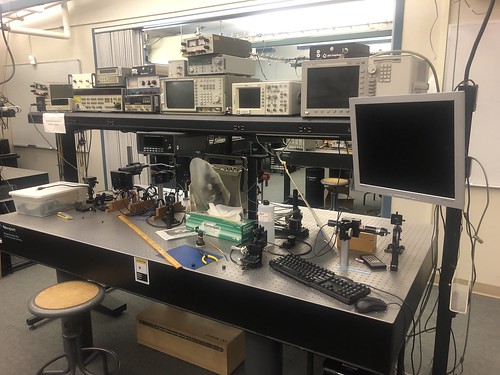Location: 20-134/135
Coordinator: Xiaomin Jin
Facilitates: EE 443, EE 458, Research Programs
Description

Photonics is a blend of Optical Engineering and Electrical Engineering. The Photonics program in the Electrical Engineering Department of Cal Poly was established in 1985 with a lecture course in fiber optics. With the assistance of Hewlett-Packard and several other corporations, a fiber optics laboratory was introduced in 1986. Currently there are four lecture courses and two laboratory courses in fiber optics and photonic engineering:
- EE 403/EE 443- Fiber Optic Communication Lecture/Laboratory
- EE 418/EE 458- Photonic Systems Engineering Lectuer/Laboratory
- EE 530- Fourier Optics
At least 100 seniors annually take either or both the fiber optics and the photonic engineering lecture courses. Of these, at least 80 take either or both of the associated laboratory courses. In addition, at least 15 senior projects and 3 master's theses are completed in fiber optics and photonics annually. The photonics courses are the most heavily subscribed elective courses in the electrical engineering program.
The photonics laboratory has improved dramatically within the past few years. We have received approximately $250,000 in cash and over $600,000 in equipment grants. In addition, the State has committed over $40,000 to the laboratory. These resources have been used to purchase equipment for three workstations used in two laboratory courses. The workstations allow the students to make fundamental measurements in fiber optics, networks, and photonics using modern equipment and techniques.
An important feature of the photonics laboratory is the extensive use of the GPIB interface between instruments and a personal computer. A majority of the experimental work involves the use of graphical programming environment to acquire data over the GPIB interface, process and display it, and then print the results on a laser printer.
The Photonics Lab functions as both a teaching laboratory and a research laboratory. Professor Derickson has an active research program in the area of High Speed Optoelectronics. Most recently his research as been in the area of LIDAR and Optical Coherence Tomography.